#debunking vegan myths
Text
The Impact of Positive Change Veganism
Introduction:
In recent years, veganism has become more than just a dietary choice; it has become a movement for positive change. People all over the world are embracing a vegan lifestyle not only for their health but also for the environment and animal welfare. Let's explore the impact of positive change veganism and why it has become a powerful force for good.
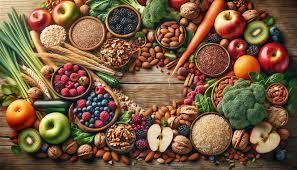
What is Positive Change Veganism?
Positive change veganism is not just about what you eat; it's a holistic approach to living that aims to make a positive impact on the world. It goes beyond avoiding animal products and focuses on promoting sustainability, compassion, and social justice. By choosing to live a vegan lifestyle, individuals can reduce their carbon footprint, support ethical treatment of animals, and improve their own health.
How Does Positive Change Veganism Make a Difference?
Positive change veganism has the power to create a ripple effect of positive change in the world. By reducing the demand for animal products, vegans can help lessen the environmental impact of factory farming, which is a leading cause of deforestation, water pollution, and greenhouse gas emissions. Additionally, choosing plant-based foods can help alleviate world hunger by using resources more efficiently and ethically.
Benefits of Positive Change Veganism:
Improved health: A plant-based diet has been shown to lower the risk of many chronic diseases, including heart disease, diabetes, and cancer.
Environmental preservation: By reducing our reliance on animal agriculture, we can help protect the planet for future generations.
Animal welfare: Choosing not to support industries that exploit animals can help reduce suffering and promote compassion.
Social justice: Many communities around the world are disproportionately affected by the negative impacts of animal agriculture, such as pollution and food insecurity. Positive change veganism can help address these injustices.
How Can Individuals Embrace Positive Change Veganism?
Making the switch to a vegan lifestyle doesn't have to be daunting. There are many resources available to help individuals transition to a plant-based diet, including cookbooks, meal plans, and online support groups. By starting with small changes and gradually incorporating more plant-based foods into your diet, you can make a positive impact on your health and the world around you.
Conclusion:
Positive change veganism is not just a trend; it's a movement that is gaining momentum around the world. By choosing to live a vegan lifestyle, individuals can make a positive impact on their health, the environment, and animal welfare. Whether you're motivated by health, ethics, or environmental concerns, embracing positive change veganism is a powerful way to contribute to a better world for all. Start today and join the growing community of compassionate and conscious consumers who are making a difference one meal at a time.
Meta Description:
Discover the power of positive change veganism and how it can make a difference for your health, the environment, and animal welfare. Join the movement for a better world today!
By following the guidelines above, we can create a compelling and informative article that showcases the benefits and importance of positive change veganism while engaging readers and encouraging them to take action. Let's continue to spread the message of positive change veganism and inspire others to make a difference in their lives and the world around them.
Website: https://cruelty.farm/
https://seogoogle99.blogspot.com/2024/04/biodiversity-and-veganism.html
https://penzu.com/p/d48c1f2e4e976ae0
#Positive Change Veganism#Plant-Based Success Stories#Debunking Vegan Myths#Vegan Support Network#Traveling as a Vegan#Quick Vegan Meals#Vegan Dining Out Tips#Vegan Pantry Essentials#Plant-Based Meal Planning
1 note
·
View note
Text
5 Vegan Myths That Need To Die! 💀 — Weekly Health Trends
View On WordPress
#Are vegans statistically healthier?#debunking vegan myths#Do doctors recommend going vegan?#Do vegans get injured more often?#Do vegans live longer?#How does going vegan affect your body?#Is being vegan scientifically proven?#Is being vegan spiritual?#Is it actually healthy to be vegan?#Is vegan or Pescatarian healthier?#the truth about veganism vegan b12 myth vegan life expectancy myth vegan stroke risk debunked vegan no more 1#vegan b12 myth#Vegan life expectancy myth#vegan myths about meat#vegan myths and facts#What are the negatives of a plant-based diet?#What is negative about being vegan?#What is unhealthy about a vegan diet?
0 notes
Text
The Ethical Vegan Diet: More Sustainable Future

Introduction:
The ethical vegan diet is gaining popularity for its focus on compassion and sustainability. Ethical vegans abstain from consuming animal products, aiming to eliminate harm directed towards animals while supporting a more environmentally-friendly food system. This article will delve into the principles of Ethical vegan eating, highlighting the ethical and environmental consequences of animal agriculture. Furthermore, we will explore the health benefits associated with adopting an ethical vegan diet and provide practical tips for implementing this lifestyle choice.
The Ethical Implications of Animal Agriculture:
Animal agriculture is a primary contributor to various ethical dilemmas surrounding animal rights. The factory farming industry subjects animals to overcrowded, unsanitary living conditions and inhumane treatment. Ethical vegans argue that all sentient beings have an inherent right to life, freedom, and protection from unnecessary suffering. By avoiding animal products, ethical vegans refuse to support an industry that promotes cruelty and exploitation.
Additionally, the widespread use of antibiotics and hormones in animal agriculture poses significant health risks. Routine use of antibiotics leads to the emergence of antibiotic-resistant bacteria, jeopardizing public health. Ethical vegans advocate for a food system that prioritizes the well-being of both humans and animals, highlighting the need for a shift towards plant-based alternatives.
Environmental Benefits of Ethical Veganism:
Beyond ethical concerns, adopting an ethical vegan diet also has significant environmental benefits. Animal agriculture is a major contributor to deforestation, greenhouse gas emissions, and water pollution. Livestock farming requires vast amounts of land, leading to the destruction of ecosystems and loss of biodiversity.
Furthermore, the process of rearing animals for food is extremely resource-intensive, requiring substantial water usage, feed production, and transportation. Animal agriculture is responsible for a significant portion of global greenhouse gas emissions, primarily due to methane released by livestock. By choosing to consume plant-based alternatives, ethical vegans reduce their carbon footprint and contribute to a more sustainable future.
The Health Aspect of Ethical Veganism:
Contrary to common misconceptions, an ethical vegan diet can meet all nutritional requirements. Well-planned vegan diets can be nutritionally adequate and provide all essential vitamins, minerals, and macronutrients needed for optimal health. Plant-based diets are rich in fiber, vitamins, and antioxidants, which can help in reducing the risk of chronic diseases such as heart disease, diabetes, and certain types of cancer.
However, to ensure adequate nutrient intake, ethical vegans need to pay attention to certain nutrients like vitamin B12, omega-3 fatty acids, iron, calcium, and zinc, which are commonly found in animal products. These can be obtained through vegan-friendly fortified foods, supplements, or careful selection of plant-based sources.
Practical Tips for Adopting an Ethical Vegan Lifestyle:
Transitioning to an ethical vegan diet can be a gradual process. Start by incorporating more plant-based meals into your routine and experimenting with various fruits, vegetables, grains, and legumes. Educate yourself about plant-based nutrition and seek guidance from registered dietitians or nutritionists to ensure a balanced diet.
Explore the wide variety of vegan alternatives available, such as tofu, tempeh, seitan, lentils, and nut-based milks. Experiment with different cooking techniques and flavor combinations to discover delicious plant-based meals.
In addition to diet, ethical veganism extends to the use of animal-derived products like clothing, cosmetics, and household items. Opt for cruelty-free and vegan alternatives whenever possible, avoiding products that have been tested on animals or contain animal-derived ingredients.
Conclusion:
Adopting an ethical vegan diet aligns individual food choices with moral principles, promoting compassion for animals and environmental sustainability. Through eliminating animal products, ethical vegans prioritize the well-being of all sentient beings and minimize their environmental impact. By understanding the ethical implications of animal agriculture and acknowledging the numerous health benefits associated with plant-based diets, individuals can make informed choices that promote a more compassionate and sustainable future. Please visit here Ethical vegan eating for more information.
#Factory farm animal cruelty#Vegan diet benefits#Unnecessary meat consumption#Dairy industry dangers#Meat industry hazards#Animal abuse in agriculture#Health benefits of veganism#Climate change and meat#Antibiotic resistance farming#Ethical vegan eating#Sustainability and veganism#Plant-based protein sources#Deforestation and meat industry#Debunking protein myth#Meat#dairy health risks#Greenhouse gas emissions farming#Dairy industry animal cruelty#Vegan diet sustainability#Environmental meat industry costs#Animal welfare and veganism
0 notes
Text
so i dragged my younger sister to a local vegan event last saturday where two local vegan athletes and bodybuilders (both of many medals) held a podcast and debunked a lot of myths spun by carnivores esp nutrition-wise. a vegan physician chimed in from the audience as well. it was a lot of gr8 info and v cool to hear from vegan athletes up close
so i didn’t think she was paying any attention at all but this week she sends me a tiktok of a woman’s recipe for a vegan bean and spinach soup and asks if i can help her make it since i have an instant pot and vegan broth base. and she NEVER texts me jsyk
kind of feeling hopeful….. maybe some of it got through to her??? she’s never shown interest in vegan recipes before…..i’m gonna let myself hope…..
16 notes
·
View notes
Text
I guess I need a pinned post!
Hi, I'm Bug. I'm 24, autistic, and nonbinary.
This is my main blog, but I have many side blogs. So I may like and follow from here and reblog from elsewhere.
This blog is dedicated to my love of plants, bugs, animals, and nature in general.
More below the cut, including a mini rant disparaging cottagecore as a concept ;p
Some interests and covered topics include:
● solarpunk
● companion planting crops
● native plant yards (this blog hates grass lawns)
● foraging
● mushrooms (as food & art not recreation)
● wild and native edible plants
● vulture culture, animal specimens, etc
● climate change activism (mostly I try to keep political stuff on a separate blog but politics and loving and protecting the earth are intrinsically linked)
● indigenous & native people's rights (including hunting rights, and land back / sovereignty)
● bugs!!!
● debunking myths and fear mongering around 'scary' animals and insects (this is a pro-sharks, snakes, and spiders blog!)
● animal rights? (I'm not sure how much this'll come up. But fuck factory farming.)
DNI: terfs, tradwives, white supremacists, militant evangelical vegans
I will block you ^-^
Some more about me unrelated to the blog
I'm AuDHD, vegan, disabled, otherkin, I play videogames, I have 5 cats, a small garden and a few indoor plants. I'm currently indulging in my crochet special interest.
And lastly a rant about cottagecore
Cottagecore aesthetics are based on a colonialist escapist fantasy of 'untamed' land. We cannot escape what we owe others and the earth by ~disappearing into the woods~ and running away from the responsibility we have to eachother. Politically cottagecore and similar ideas are distasteful at best and outright racist at worst. I acknowledge my blog often runs adjacent to or directly in line with cottagecore blogs. Cottagecore accounts are free to interact with my blog but you will probably find yourself uncomfortable with my more political posts. I invite you to sit with that discomfort. If your aesthetic posts, your comfort fantasy, never once involve a disabled person or person of color? That's a really uncomfortable place to find yourself if you don't consider yourself a racist, or ableist. We all carry the prejudices of our societies inside ourselves, it's your responsibility to do the work to unpack that and become better and kinder. Your escapist fantasies should in no way mirror white supremacist & eugenics fantasies if you yourself are not one. Do better and be kinder ❤️
Related but not as serious, but the romanticization of hard manual labor is pretty funny. Obviously you can romanticize your real life if you so wish. But people who have never worked on a farm, tended crops, or maintained a home fawning over a glamorized version of that lifestyle is silly to see. Farming is hard work, caring for land is hard work. I'm not trying to gatekeep, God knows I can't be a farmer. Just think about how much work goes into those homes and the food and plants you see in these aesthetic pictures. You'll come to appreciate them a lot more I think.
#earthcore#dirtcore#bug aesthetic#insectcore#bugcore#mushroomcore#mushrooms#wild plants#plants#bugs#solarpunk#about me#land back
2 notes
·
View notes
Text
Will Sunscreen Cause Acne?
Welcome to Aussenskin, where safe skincare is our utmost priority. We take immense pride in offering you our organic Australian-made Vegan SPF50 sunscreen with added hyaluronic acid—a product designed to provide superior sun protection without compromising your skin's health. Today, we'll tackle a common concern: whether sunscreen can cause acne. Join us as we debunk the myth and shed light on how the right sunscreen can actually benefit acne-prone skin.
The Myth Surrounding Sunscreen and Acne
It's not uncommon to come across claims that sunscreen can cause or worsen acne, leaving many individuals hesitant to use it regularly. However, it's crucial to separate fact from fiction and understand how sunscreen works in relation to acne-prone skin.
Understanding the Importance of Sunscreen
Before delving into the connection between sunscreen and acne, let's emphasize the significance of using sunscreen. Sunscreen is an essential component of any skincare routine, regardless of skin type or concerns. It shields your skin from the sun's harmful UV rays, preventing sunburn, premature aging, and reducing the risk of skin cancer. Safe skincare practices involve incorporating sunscreen into your daily regimen, ensuring your skin stays protected and healthy.
Sunscreen and Acne-Prone Skin
Some individuals with acne-prone skin may be wary of using sunscreen due to concerns that it could clog pores or exacerbate breakouts. The reality is that not all sunscreens are created equal, and some formulations may be more likely to cause issues for acne-prone individuals. However, it's essential to find the right sunscreen that suits your skin's needs.
Non-Comedogenic Formulas
The key to avoiding acne breakouts while using sunscreen lies in choosing non-comedogenic formulas. Non-comedogenic sunscreens are specifically designed not to clog pores, making them ideal for acne-prone skin. Our Aussenskin sunscreen is formulated with non-comedogenic ingredients, ensuring it won't block pores or contribute to acne breakouts.
Look for Oil-Free and Lightweight Formulations
Acne-prone skin tends to be more sensitive to heavy or greasy products. To prevent potential breakouts, opt for oil-free and lightweight sunscreen formulations. These types of sunscreens are less likely to feel heavy on the skin and won't add excess oil that could contribute to acne.
Patch Test New Sunscreens
If you have concerns about trying a new sunscreen, perform a patch test before applying it all over your face. Apply a small amount of sunscreen to a small area on your forearm or jawline and wait 24 to 48 hours. If no negative reactions occur, you can confidently use the sunscreen on your face.
Sunscreen itself does not cause acne. The key to safe skincare for acne-prone individuals lies in choosing the right sunscreen that is non-comedogenic, oil-free, and lightweight. Our organic Australian-made Vegan SPF50 sunscreen with added hyaluronic acid is a perfect choice, as it is designed to provide superior sun protection without clogging pores or contributing to acne breakouts. Embrace the importance of sunscreen in your daily skincare routine, and you can enjoy clear, healthy, and protected skin under the care of Aussenskin. Here's to a lifetime of safe skincare and confident beauty!
#acne#sunscreen#aussenskin#sensitive skin#australian made#skincare#organic skincare products#australian#sensitiveskincare#safeshoppingmovement#safeskincare#spf50
4 notes
·
View notes
Text
i was going to reblog that post with someone conflating out of touch karens with "slavery quinoa vegans" but interestingly they turned off reblogs. but i didn't write this all for nothing
literally the first result on google when searching "slavery quinoa":
Debunking the myths around vegans and quinoa production: Nonvegan Leftists are engaging in misinformation when they derail vegan advocacy with quinoa production and consumption.
This has been debunked for fucking years now. The original article that gave people (twitter) the "slavery quinoa" idea doesn't mention slavery, human trafficking, or even exploited laborers. The farmers themselves actually had somewhat of an economic boom. The issue they mention is that it became expensive for consumers in countries where it's grown. There's also no source that shows vegetarians/vegans eating more quinoa than anyone else.
sorry if it sounds annoying but people making posts about how "nobody knows how food production works outside their immediate community" usually don't know much about food production outside of their immediate community either. which is kind of the point of the post anyway. i'm not even bringing up a new argument here it's just weird to see posts perform their own thesis
anyway please just fucking stop saying "slavery quinoa" forever already.
#sorry to those who feel annoyed by the tone of the first link. but like not really. it has decent sources#tg even had to add a disclaimer on their article like 'we found out it's not vegans eating all the soy its uh. 97% for livestock.'#like yeah no shit! no metric shows that plant based diets are the main reason for overfarming of ANYTHING let alone soy or quinoa#im ranting
6 notes
·
View notes
Text

At ChòpnBlọk in Houston, customers line up for dishes like the Golden bowl, which includes jollof rice with a Creole twist, plantains, roasted cauliflower and brussels sprouts served with a vegan curry.Credit...Michael Starghill Jr. for The New York Times
West African Chefs Take a Page From the Fast-Casual Playbook
For these second-generation business owners, the familiar format offers a gateway to a wider audience.
At ChòpnBlọk in Houston, customers line up for dishes like the Golden bowl, which includes jollof rice with a Creole twist, plantains, roasted cauliflower and brussels sprouts served with a vegan curry.Credit...Michael Starghill Jr. for The New York Times
Oct. 3, 2022
HOUSTON — At POST Houston, a popular food hall, the lines stretch long for ChòpnBlọk, where the Nigerian American owner Ope Amosu offers a familiar customizable template — rice, vegetables, protein — that are deeply influenced by his West African pride, and his London-born, Houston-raised identity.

Take the Golden, a nod to the Gold Coast of West Africa — and to Mr. Amosu’s stint as a prep cook at Chipotle while still working as a corporate sales executive. The hearty meal includes smoky jollof rice with a Creole twist, plantains, roasted cauliflower and brussels sprouts, and comes with a vegan honey bean coconut curry that’s at once sweet and alluringly tangy. To top it all, customers can choose from various proteins marinated in Cameroon pepper.
The traditional West African restaurants that dot southwest Houston are cozy, dimly lit spaces and often family-owned. But at restaurants like ChòpnBlọk, which regularly appears on the city’s dining lists and is lauded on social media by celebrities like the “Insecure” star Yvonne Orji and the rappers Jidenna and Wale, the West African flavors and staples are quicker, more casual and — their owners argue — more accessible to non-African diners.

“We’re not trying to convince people our food is good or worthy — we already know that it is,” Mr. Amosu said. “I am, however, trying to tell our story and welcome people in who may be nervous about going to a place that feels a bit unfamiliar.”
In food halls, strip malls and shopping centers across the United States, fast-casual West African restaurants are proliferating, and the second-generation owners behind them are at once showcasing the range of these cuisines and debunking reductive myths about them.
At the Senegalese chef Pierre Thiam’s restaurant Teranga in New York City, deeply flavored customizable grain bowls help to counter racist Western perceptions that can diminish the value of the region’s cuisine.
“I hope that it helps dispel the lies that make you think of Africa as a continent of scarcity,” Mr. Thiam said. “There’s so much abundance, and there’s so much creativity that’s coming from the continent, and we get to show them that story through our food.”
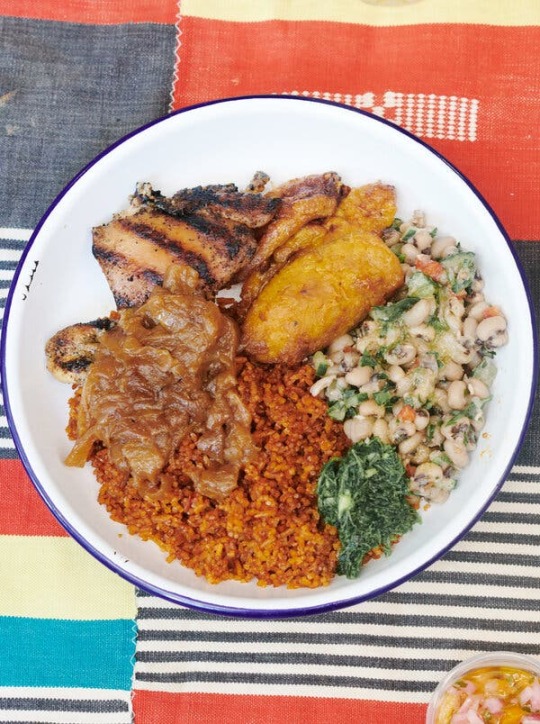
The fast-casual model allows West African chefs to preserve the region’s classic flavors as well as incorporate elements of their American upbringings in a format that is recognizable to diners less familiar with the cuisine.
“We’re creating a gateway to West African food,” said Olumide Shokunbi, the owner of Spice Kitchen in Brentwood, Md.
Like Mr. Amosu, Mr. Shokunbi attended the school of Chipotle — one of the nation’s best examples of fast-casual success. During college, he began working at a Chipotle franchise on the side as he explored opening his own business.
His Spice Kitchen adopts some central components of the fast-casual model: biodegradable serving bowls, customizable meals and a varied interpretation of storied cuisines. Since it opened last fall, the restaurant has offered salmon and shrimp alongside suya — Nigerian seasoned, skewered and grilled meats — and sides like spinach efo riro, jollof rice and grilled corn.


At Suya Suya West African Grill in Philadelphia, the owner Dera Nd-Ezuma, who developed a love for tacos after immigrating from Abuja, Nigeria, to New Jersey in 2007, takes a similar approach. To amplify traditional dishes like steak marinated in Nigerian yaji, Mr. Nd-Ezuma leans into his love of tacos and offers them filled with chicken and steak suya in the requisite brown to-go container.
“There’s a reason why our restaurants are finding success,” he added. “People want to experience this cuisine, and they want to do it in a way that feels comfortable.”
Having gone to many of the city’s more conventional Nigerian restaurants, Mr. Nd-Ezuma said he sometimes found the atmosphere intimidating.
“When I get to go to African restaurants and I try to order, the menu can be a little bit overwhelming, so I can only imagine what it’s like for non-Africans,” Mr. Nd-Ezuma said.
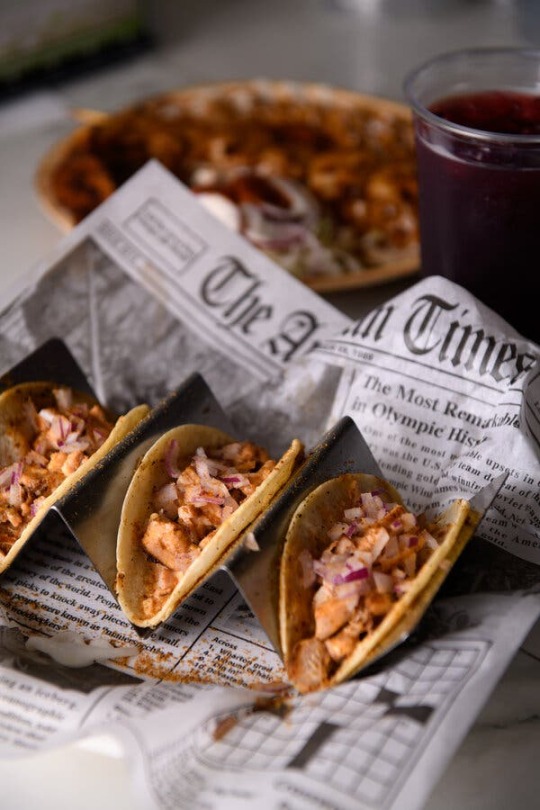
Citing a psychology construct called “openness to experience,” which is a high predictor of whether someone would try different cuisines, Germine Awad, a professor of psychology at the University of Michigan, said that it’s not how something is served that draws patrons in, but rather their natural curiosity levels.
The growing interest in West African food within the restaurant industry aligns with immigration trends. “The more folks that come, the higher the demand for food that’s authentic and a true reflection of that community,” Ms. Awad said.
In 1980, there were about 40,000 West African immigrants living in the United States, according to data from the Pew Research Center. By 2019, that number had grown exponentially, to 890,000. Nigerian immigrants are the largest group from the region, with the most sizable communities living in cities like Atlanta, Dallas, Houston, New York City and Washington, D.C.
The inevitable expansion of fast-casual West African restaurants will continue bringing these foodways to the forefront of American dining — an overdue change, Ms. Awad believes, in the culinary world.
“It’s not just enough to have these restaurants available to people, this cuisine has to be recognized for how complex and amazing it is,” she said. “That’s the true next step for expanding the idea of the average culinary experience in the United States.”
At Teranga in San Francisco (no relation to Mr. Thiam’s restaurant), the Senegalese chef Nafy Flatley-Ba creates dishes like chicken drumsticks marinated in baobab, tamarind and Dijon, a family specialty. Highlighting Senegalese flavors is a top priority for Ms. Flatley-Ba, but equally important is showing that women can and should play a leading role in contemporary West African dining.
“It hasn’t been easy to introduce fast-casual, yet super nutritious and healthy West African food,” Ms. Flatley-Ba said. “But I have been doing it.”

Some conventional West African diners might complain that the foods at these fast-casual restaurants isn’t traditional. But that’s not Mr. Amosu’s primary concern at ChòpnBlọk. The restaurant is a chance to revel in his heritage, by creating dishes that expand on the narratives of the region’s cuisines.
“Our stuff bangs, too, and everybody should know about it,” Mr. Amosu said. “There’s no reason why we should be so insular with the pride that we have for our culture.”
Authenticity and fast-casual service aren’t mutually exclusive, and Hema Agwu and Folusho Adeyemo, the Nigerian American owners of Brooklyn Suya in Crown Heights, Brooklyn, have no interest in compromising West African flavors to please Western appetites.

“It’s all about finding the balance of being both authentic and contemporary, you know, and open for a new audience,” Mr. Agwu said.
The menu reflects multiple cultures, integrating American ingredients like kale and avocado into their suya bowls, which can come with shrimp, chicken, eggplant or tofu marinated in suya spice. But the real common ground, Mr. Agwu said, comes on the side.
“Americans love sauce,” Mr. Agwu said. “We have to give the people what they want.”
#West African Fast-Casual Restaurants Are Finding Wider Audiences#West African#West African Food#Healthy Food
7 notes
·
View notes
Text
"Nutrición Saludable: Consejos y Recetas para Mejorar tu Estilo de Vida"
"Healthy Nutrition: Tips and Recipes to Improve Your Lifestyle"
¡Bienvenidos a mi blog sobre nutrición!
Mi nombre es JADE , y soy nutricionista. En este blog, quiero compartir información valiosa y práctica sobre nutrición para ayudar a las personas a mejorar su salud y bienestar a través de la alimentación.
En este blog, encontrarás una amplia variedad de temas relacionados con la nutrición, que incluyen:
Consejos de alimentación saludable: Ofreceré consejos prácticos para seleccionar alimentos saludables, cocinarlos y preparar comidas balanceadas y nutritivas.
Información sobre nutrientes: Explicaré la importancia de los diferentes nutrientes en nuestra dieta, incluyendo proteínas, carbohidratos, grasas, vitaminas y minerales.
Nutrición deportiva: Ofreceré consejos sobre cómo optimizar la nutrición para deportistas, incluyendo recomendaciones para antes, durante y después del ejercicio.
Dieta para condiciones médicas: Proporcionaré recomendaciones dietéticas para condiciones médicas específicas, como diabetes, hipertensión, enfermedades cardiovasculares y problemas gastrointestinales.
Mitos sobre nutrición: Discutiré los mitos comunes relacionados con la nutrición y proporcionaré información basada en la evidencia para desmentirlos.
Recetas saludables: Compartiré recetas saludables y nutritivas para ayudarte a incorporar más alimentos saludables en tu dieta.
Tendencias de nutrición: Discutiré las tendencias actuales de nutrición, como las dietas veganas, cetogénicas y sin gluten.
Mi objetivo es ofrecer información valiosa y práctica sobre nutrición que pueda ayudarte a tomar decisiones más informadas sobre tu dieta y estilo de vida. Si tienes alguna pregunta o tema que te gustaría que aborde en el blog, por favor házmelo saber en los comentarios.
¡Gracias por visitar mi blog sobre nutrición! Espero que encuentres la información útil y valiosa para mejorar tu salud y bienestar.
"Nutrición Saludable: Consejos y Recetas para Mejorar tu Estilo de Vida"
Welcome to my nutrition blog!
My name is JADE, and I am a nutritionist. In this blog, I want to share valuable and practical information about nutrition to help people improve their health and well-being through food.
In this blog, you will find a wide variety of topics related to nutrition, including:
Healthy eating tips: I will offer practical tips for selecting healthy foods, cooking and preparing balanced and nutritious meals.
Nutrient information: I will explain the importance of different nutrients in our diet, including proteins, carbohydrates, fats, vitamins, and minerals.
Sports nutrition: I will provide tips on how to optimize nutrition for athletes, including recommendations for before, during, and after exercise.
Diet for medical conditions: I will provide dietary recommendations for specific medical conditions, such as diabetes, hypertension, cardiovascular disease, and gastrointestinal problems.
Nutrition myths: I will discuss common myths related to nutrition and provide evidence-based information to debunk them.
Healthy recipes: I will share healthy and nutritious recipes to help you incorporate more healthy foods into your diet.
Nutrition trends: I will discuss current nutrition trends, such as vegan, ketogenic, and gluten-free diets.
My goal is to provide valuable and practical information about nutrition that can help you make more informed decisions about your diet and lifestyle. If you have any questions or topics you would like me to address in the blog, please let me know in the comments.
Thank you for visiting my nutrition blog! I hope you find the information useful and valuable for improving your health and well-being.

#salud#nutricion#diet plan#vida sana#healthy#comida#dieta equilibrada#alimentacionsaludable#english#spanish
3 notes
·
View notes
Text
Working with Kundalini: An Experiential Guide to the Process of Awakening
Description:
A guide to moving gracefully through the 3-phase process of Kundalini awakening
• Explains the three phases of Kundalini awakening, the effects of pre-Kundalini and neuro-Kundalini, and Kundalini’s connection to the chakras and the spiritual heart
• Describes the physical, emotional, and spiritual effects of Kundalini energy, including the rerouting of digestive fire, which can lead to food allergies and sensitivities
• Explores supportive dietary and alternative health modalities, including fasting, paleo, keto, vegetarian, and mono diets, herbal allies, and meditation
Kundalini awakenings can have profound physical, emotional, and mental effects, making it difficult to cope with everyday life, yet these powerful awakenings can also allow you to release past trauma, see past the illusions of the false self, and awaken your spiritual heart, enabling you to recognize the divine self.
In this step-by-step guide to the 3-phase process of Kundalini awakening, Mary Shutan delivers practical information on how to deal with such a spiritual emergence in our modern world. Starting with her own story, she describes the nature of Kundalini energy, the reasons for the energy rising, and the connection to the chakra system. Debunking the myths associated with Kundalini awakening, she explains how the first phase of Kundalini rising involves a surging up of fire–the fire of purification. It releases the past, liberates you from past bondages and beliefs, and disrupts the neuro-endocrine systems of the body. The second phase involves expansive experiences of ecstasy, peace, bliss, and emptiness states as the upper chakras open, greater perspective on life comes in, and you connect with cosmic consciousness. The third phase, the opening of the spiritual heart, is a shift from upward-flowing energy to a downward flow of grace into the heart center, leading to compassion, re-anchoring in the world, and the embodiment of light.
Exploring how Kundalini profoundly rewires the physical body and the mind, the author describes the rerouting of digestive fire during the rising of Kundalini energy. She explores the relationship between Kundalini and food allergies and sensitivities as well as supportive dietary and alternative health modalities, including fasting; paleo, keto, vegetarian, vegan, and mono diets; herbal allies; and mineral supplements. She also explores sexual practices that may help or hinder the process and meditation techniques to facilitate Kundalini awakening during each phase.
Providing detailed guidance for each phase of Kundalini awakening, this experiential guide supports you as you transform not only emotionally and spiritually but also physically and socially into your divine self.
2 notes
·
View notes
Text
How to Make the Most of cruelty farm's Features
Factory Farm Cruelty: Confined and Deprived Lives Hidden Horrors: Exposing Factory Farm Conditions The Cost of Cheap Meat: Animal Suffering in Industrial Agriculture Can Animals Feel Pain? Science Says Yes Ethical Food Choices: Reducing Animal Cruelty on Your Plate Vegan Diet Benefits: Plant-Based Power: A Vegan Diet for Optimal Health Vegan for Weight Management: Manage Blood Sugar and Achieve Goals Heart-Healthy Vegan: Lower Cholesterol and Reduce Disease Risk Boost Your Gut Health: Vegan Diet and a Thriving Microbiome Stronger Bones, No Dairy Needed: Calcium-Rich Vegan Options Get Enough Vitamin B12: Essential Tips for Vegans Why Humans Don't Need Meat: Complete Protein on a Plant-Based Plate: Myths Debunked Building Muscle with Vegan Protein Sources: Strong and Sustainable Athletes and Vegans: Thriving on Plant-Based Power Human Evolution and Diet: Rethinking Our Need for Meat Essential Nutrients from Plants: A Balanced Vegan Diet Dangers of Meat and Dairy Industry: Environmental Damage from Factory Farming: Deforestation and Pollution Climate Change Culprit: The Meat and Dairy Industry's Impact Water Crisis: The Unsustainable Water Usage of Animal Agriculture Antibiotic Resistance: A Threat from Factory Farm Practices Foodborne Illness Risks: Contamination in the Meat Industry Human Health Concerns: Processed Meats and Cancer Risk: The Science Behind It Saturated Fat and Cholesterol: Animal Products and Heart Disease Type 2 Diabetes and Red Meat Consumption: A Concerning Link Chronic Inflammation: Can Animal Products Make it Worse? Dairy and Certain Cancers: Exploring the Potential Connection A Compassionate Choice: Veganism: A Movement for Animal Welfare Sustainable Food Systems: Veganism for a Healthier Planet Food Justice and Veganism: Promoting Equity and Access Making a Difference: The Power of Individual Vegan Choices Vegan Lifestyle: Compassionate Living Beyond the Plate Exploring Veganism: Transitioning to Vegan: Easy Steps for Beginners Delicious Vegan Recipes: Explore a World of Plant-Based Flavors Vegan Meal Planning: Creating Balanced and Nutritious Meals Finding Vegan Options While Dining Out The Vegan Community: Support, Resources, and Inspiration Addressing Concerns: Common Vegan Myths Debunked: Protein, Calcium, and More Is Vegan Right for You? Exploring the Benefits and Challenges Vegan Diets for All Ages: Ensuring Proper Nutrition Throughout Life Vegan Travel: Finding Delicious and Sustainable Food Options
#cruelty farm#Plant-Based Power#Vegan for Weight Management#Heart-Healthy Vegan#Get Enough Vitamin B12#Complete Protein on a Plant-Based Plate
1 note
·
View note
Text
Are Meat Eaters Healthier Than Vegans? Debunking the Myth
As a nutritionist, I am often asked whether meat eaters are healthier than vegans. The answer is not as straightforward as one might think. Both diets can be healthy, but it depends on the individual's food choices and dietary patterns.
In this article, I will examine the nutritional comparisons between diets, health outcomes and disease risks, and dietary patterns and lifestyle factors to help answer this question.
It is important to note that both diets can meet all of the body's nutritional needs. A well-planned vegan diet can provide all of the necessary nutrients, including protein, iron, calcium, and vitamin B12.
However, some nutrients, such as vitamin B12 and omega-3 fatty acids, are more readily available in animal-based foods.
Read the full article
0 notes
Text
Unveiling the Nutritional Marvels of Organic Hemp Seeds: A Comprehensive Guide to Health and Sustainability
I. Introduction
A. The Rising Popularity of Organic Hemp Seeds
In recent years, organic hemp seeds have undergone a remarkable surge in popularity, capturing the attention of health enthusiasts and eco-conscious consumers alike. This newfound acclaim is not merely a fleeting trend but is grounded in the exceptional nutritional benefits and sustainable cultivation practices that make organic hemp seeds a staple in kitchens worldwide.
B. Nutritional Benefits and Environmental Impact
Beyond the enticing nutty flavor that graces the palate, organic hemp seeds stand out for their nutritional richness. More importantly, their cultivation leaves a minimal environmental footprint, positioning them as a commendable choice for conscious consumers committed to both personal health and planetary well-being.
II. What Are Organic Hemp Seeds?
A. Origins and Definition
Derived from the Cannabis sativa plant, organic hemp seeds set themselves apart from their notorious cousin, marijuana, by containing negligible amounts of psychoactive compounds. Harvested from the hemp plant's flowers, these seeds are not only rich in essential nutrients but also free from the mind-altering effects often associated with cannabis.
B. The Organic Label
The organic label holds significant weight in the realm of hemp production. Cultivated without synthetic pesticides, herbicides, or genetically modified organisms (GMOs), organic hemp seeds exemplify a commitment to purity and environmental responsibility, ensuring a wholesome product for consumers.
III. Nutritional Composition of Organic Hemp Seeds
A. Plant-Based Protein and Amino Acids
Hemp seeds emerge as a plant-based protein powerhouse, providing an excellent alternative for vegetarians and vegans. Beyond protein, they offer all nine essential amino acids, rendering them a complete and highly digestible source of this vital nutrient.
B. Heart-Healthy Fatty Acids
The delicate balance of Omega-3 and Omega-6 fatty acids in organic hemp seeds contributes significantly to heart health and overall well-being. This optimal ratio distinguishes them as a heart-healthy addition to a balanced diet.
C. Vitamins and Minerals
Hemp seeds harbor a treasure trove of essential nutrients, from vitamin E to magnesium. This nutrient diversity supports immune function, enhances skin health, and fortifies bone strength, underscoring their multifaceted contribution to holistic well-being.
IV. Sustainable Cultivation Practices
A. Organic Farming Methods
The cultivation of organic hemp seeds adheres to stringent organic farming methods, avoiding synthetic chemicals and prioritizing natural fertilizers and pest control. This conscientious approach safeguards soil health and preserves biodiversity.
B. Environmental Benefits
Opting for organic hemp seeds translates to positive environmental impacts. Reduced chemical runoff, water conservation, and soil regeneration exemplify the environmentally friendly practices that distinguish organic hemp cultivation.
V. Comparing Organic Hemp Seeds to Other Superfoods
A. Nutritional Superiority
In the realm of superfoods, organic hemp seeds outshine competitors like chia seeds and flaxseeds. Their unparalleled protein content, abundance of healthy fats, and diverse nutrient profile position them as a nutritional powerhouse.
B. Culinary Versatility
From salads to smoothies, organic hemp seeds showcase their culinary versatility. With a mild flavor and satisfying crunch, they effortlessly enhance a myriad of dishes, making them a delightful addition to any culinary creation.
VI. Addressing Myths and Misconceptions
A. Debunking Hemp Seed Myths
Dispelling common myths, it's crucial to clarify that hemp seeds do not induce a psychoactive high due to their negligible THC levels. Consumption is entirely safe and legal.
B. Hemp vs. Marijuana
Distinguishing between hemp and marijuana is essential. While hemp serves various purposes from textiles to food, marijuana is cultivated for its psychoactive properties, emphasizing the diverse applications of the versatile hemp plant.
VII. Incorporating Organic Hemp Seeds into Your Diet
A. Optimal Daily Intake
A small handful of organic hemp seeds daily offers a wealth of nutrients. Whether added to morning yogurt or sprinkled on avocado toast, integrating them into daily meals is a simple yet effective way to reap their benefits.
B. Creative Culinary Uses
Exploring various hemp seed recipes unlocks their culinary potential. From protein-packed smoothies to homemade granola bars, the possibilities are virtually endless, providing an exciting culinary journey for enthusiasts.
VIII. The Digital Impact of Organic Hemp Seeds
A. Online Searches Soar
A surge in Google searches related to organic hemp seeds signifies a growing interest among individuals curious about their benefits and culinary applications. This trend offers opportunities for digital marketers to tap into the expanding market.
B. SEO Strategies
Digital marketers can leverage this rising interest by developing informative content and optimizing keywords. Crafting compelling narratives around the benefits of organic hemp seeds can effectively drive online traffic and engagement.
IX. FAQs (Frequently Asked Questions)
A. Organic vs. Conventional Hemp Seeds
Understanding the nuances between organic and conventional hemp seeds emphasizes the absence of synthetic chemicals in the former, making them a purer choice.
B. Allergic Reactions
While hemp seeds are generally well-tolerated, individuals with allergies should consult their doctor to ensure a safe consumption experience.
C. Weight Management
The protein and healthy fats found in hemp seeds can contribute to satiety, aiding in weight control and management.
D. Sustainable
Agriculture
Choosing organic hemp seeds aligns with supporting eco-friendly agricultural practices, contributing to a healthier planet.
E. Leveraging Popularity
Digital marketers can harness the popularity of organic hemp seeds by crafting engaging narratives that resonate with audiences, fostering a deeper connection with this sustainable and nutritious choice.
In Conclusion
Organic hemp seeds transcend being a mere trendy superfood; they represent a conscious and sustainable choice that nurtures both our bodies and the Earth. So, go ahead, embrace the nutritional marvels of organic hemp seeds, and embark on a journey towards a healthier and more sustainable lifestyle
0 notes
Text
https://www.naturallife365.com/how-to-get-enough-protein-as-a-vegetarian-a-comprehensive-guide
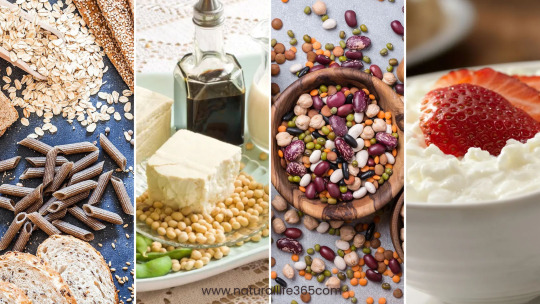
How to Get Enough Protein as a Vegetarian: A Comprehensive Guide
If you are vegetarian, you've probably heard the age-old question a million times: "But where do you get your protein?" As someone who embraces a plant-based diet, I totally get it but wait, I still eat eggs and milk.
Protein is often hailed as the holy grail of nutrition, and there's a common misconception that those who opt for plants over animal products might fall short on this vital nutrient. But fear not, my friends! I'm here to debunk that myth once and for all and show you just how easy it is to get enough protein as a vegetarian.
In this comprehensive guide, we're going to dive deep into the wonderful world of plant-based protein. Whether you're a seasoned vegan, a newbie vegetarian, or just someone curious about incorporating more plants into your diet, this guide is for you. We'll explore a variety of protein-rich plant-based foods, share delicious meal ideas, and provide practical tips to ensure you're meeting your protein needs without missing out on flavor or nutrition.
But before we get into the nitty-gritty of protein sources and meal planning, let's take a moment to understand why protein is so important, especially for those following a plant-based lifestyle. So, grab your favorite green smoothie or a handful of roasted chickpeas, and let's embark on this protein-packed journey together!
#tumblog#my writing#reading#blogs#blogger#blog#blogging#vegetarian#vegan#vegetables#food#recipes#protein#healthcare#health and wellness#healthyfood#health tips
0 notes
Text
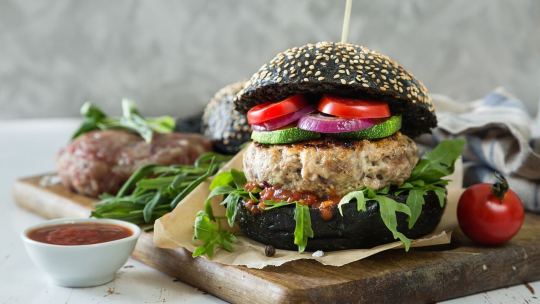
תחליפי בשר לטבעונים: הפרכת המיתוסים הנפוצים https://dafmatok.co.il/meat-substitutes-for-vegans-debunking-common-myths/?utm_source=dlvr.it&utm_medium=tumblr
0 notes